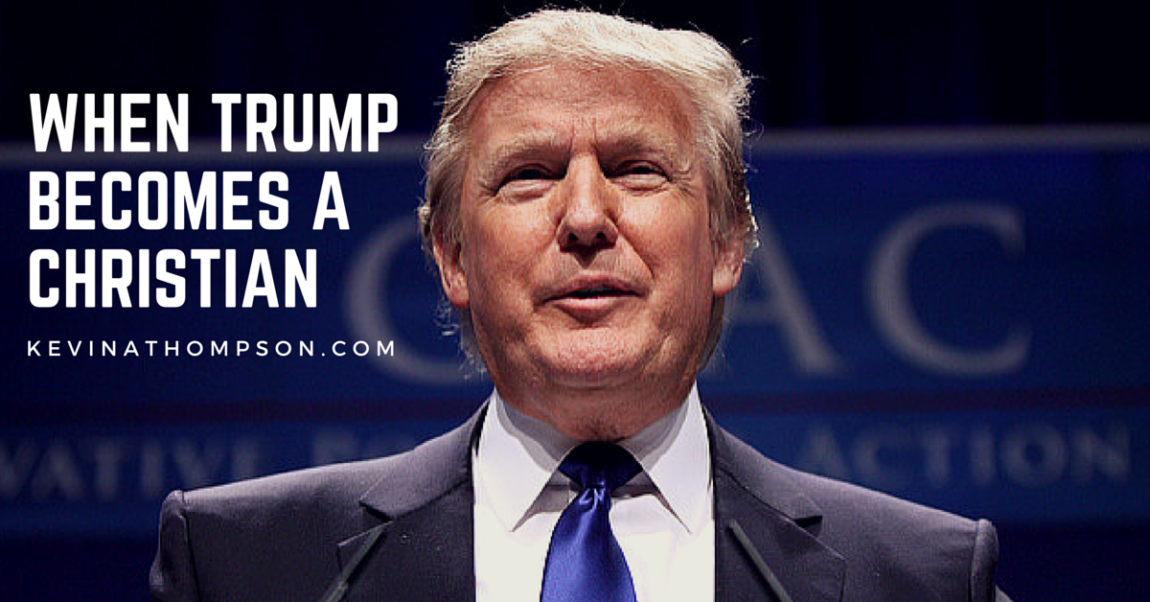After a recent meeting with Evangelical leaders, the internet is ablaze with stories about Trump praying “the sinner’s prayer” and becoming a Christian. Apparently he has had similar experiences with several pastors and leaders causing the religious right to trumpet his newfound faith.
But Christians and voters both have a right to be skeptical about a newfound faith of a politician, especially when it occurs just months before an election. How do we know when a true conversion has happened versus a publicity stunt attempting to manipulate the vote?
What Makes One a Christian
In part, the discussion of Trump has revealed a major confusion over what it means to be a Christian. Too many Christian leaders continue to push the idea that simply praying the sinner’s prayer (“Lord, I know that I’m a sinner. I ask for your forgiveness. Come into my heart and make me new again. Amen.”) makes one a Christian. While becoming a Christian often does start with a simple prayer like the sinner’s prayer, just saying the words does not make one a Christian. (See: David Platt, “What I Really Think About the Sinners Prayer…“)
To be a Christian is to be a follower of Jesus. It’s to view life the way he viewed it and attempt to live by his commands. Having been given God’s grace without merit, we respond in faith and trust our lives to Jesus. Being a Christian is not a one time event, it’s a life altering dedication to the way of Jesus.
Many people have prayed a prayer, walked an aisle, or been baptized, but those actions in no way changed their thinking or their lives. In those cases, they did not become Christians.
Every Easter, pastors love to post how many salvations happened in their churches on Easter weekend. Most years, people will ask me, “How many people got saved on Sunday.” My response is always the same: “We will see.” That’s my answer, because only time will tell if someone has truly had a life-changing experience with Jesus or if they just made an emotional decision in the moment which mean nothing in the overall definition of their lives.
I have little doubt that Donald Trump has likely said a prayer with one or multiple evangelical leaders over the past few months. I do question whether or not he has experienced a major life change. I hope he has, but time will tell.
When Trump Becomes a Christian
Becoming a Christian is a life-changing event. While not everything immediately changes, a process of transformation does begin. Our desires and affections change. Over time our actions and attitudes are transformed as well. (See: What I Mean When I Say ‘You Are a Sinner’)
It’s a process. Old behaviors and struggles can remain for a Christian. It can take a long time before outsiders see what God has done inside our hearts. Yet, faith is much more than a prayer. Without life change, faith has not taken root.
If and when Donald Trump becomes a Christian, here are some things we will notice:
- He will quickly admit his own need, imperfections, and inabilities.
- He will lean heavily on others to hold him accountable and to teach him.
- He will learn to confess his mistakes and show regret–especially in how he has treated others.
- Having received grace, he will desire to extend grace to others–even those that don’t agree with him.
- He will develop a healthy skepticism about his own opinions.
- He will stop profiting from businesses which exploit others–especially strip clubs.
- He will attempt to follow the teachings of Jesus, occasionally making him sound politically correct.
- He will recognize the vanity of building his own brand.
- He will express a natural tension between his selfish desires and God’s commands, between a love of country and a call to God’s Kingdom.
- He will feel conviction when he makes mistakes and will attempt to seek forgiveness and reconciliation.
These are just a few of the changes which would happen if Trump became a follower of Jesus. They may not happen immediately, but as he comes to understand Jesus and seeks to obey him, changes would happen.
Two Better Questions than Trump’s Salvation
While discussions regarding Trump and faith are interesting, they aren’t very relevant to my life or even the election. (See: Hate My Sin, Love Other Sinners)
Rather than focusing on the possibility of Trump’s faith, two questions are more relevant:
- Regarding the election: Regardless of their faith, which candidate am I willing to endorse with my vote?
- Regarding faith: Am I following the way of Jesus with my life?
These two questions are more relevant because they change me from a passive onlooker to an active participant. I’m not responsible for Trump’s faith and there is very little I can do about it. But I am responsible for how I vote and I am accountable to God for how I live my life.
For more, see:
Why I Discourage Christians from Politics




6 Responses to When Trump Becomes a Christian